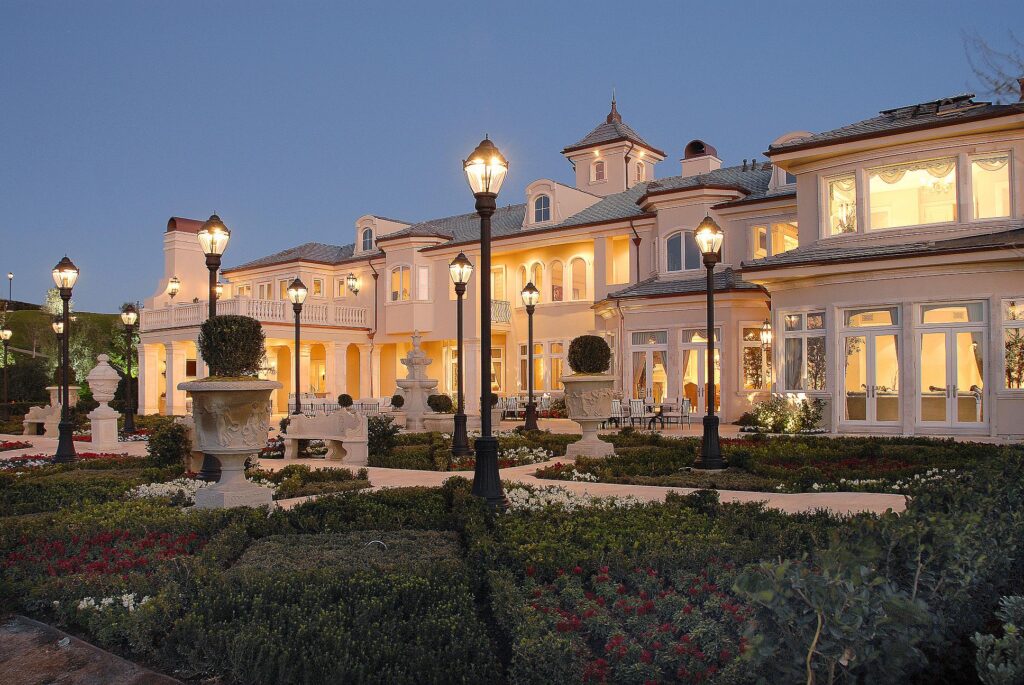Introduction
Investment in real estate has been around for a long time and is an established strategy to accumulate wealth; however, when it comes to high-end real estate, it is more risky, and the returns could be greater, as well as the potential risks are more complicated. If you are seeking a way to broaden your portfolio or profit from the premium property market, luxury real estate funds provide an effective and profitable route. The funds let investors be exposed to the most prestigious properties think multimillion-dollar mansions, high-end commercial real estate, and iconic developments–without having to purchase and manage them directly.
In this piece I’ll guide you through the main methods to invest in high-end real estate investments. No matter if you’re an experienced investor or are just beginning with these methods, they will assist you in navigating through the maze of luxury property investment to maximize the returns. We’ll also provide personal experiences from my own experiences and experience as well as actual information that illustrates the distinct advantages and challenges associated with luxury property funds.

What Are Luxury Real Estate Funds?
These funds are investment vehicles that pool funds to offer investors exposure to luxury properties. They usually target commercial or residential mixed-use projects in prime cities such as New York, London, Paris as well as Dubai, as well as more exclusive locations like Beverly Hills, and the Hamptons as well as Beverly Hills.
The investors in these funds invest capital that the fund’s management can then utilize to purchase, build, or oversee luxury real property. Funds can be targeted at various areas of the luxury real estate market, including:
- The most luxurious residential property: high-end penthouses and homes as well as estates.
- Commercial buildings: High-end offices, retail areas, and hotels.
- Mixed-use development: Property that combines commercial and residential space.
One of the main advantages of these investments is their diversification. Instead of placing all of your cash into one luxury home, You can spread the risk among a variety of luxury assets. It reduces the risk of each asset’s risk and can prove particularly unstable in the luxury market for real estate.
Why Invest in Luxury Real Estate Funds?
In the case of investing in the luxury market, the rewards can be huge. The demand for luxury real estate is historically more profitable than the general market for real estate during times of growth in the economy with higher returns. This makes it a desirable choice for those looking to invest in an increase in capital value and a steady cash flow.
The luxury real estate fund has many advantages.
- The diversification of these funds gives access to an array of luxurious properties that may be more stable than property investments made in a single investment.
- Fund managers with expertise usually have extensive experience in managing properties with high end, which can reduce risk and increase the returns.
- Access to the most prestigious Markets The majority of the high-end real estate funds are geared toward the top real estate market and could be challenging for ordinary investors to reach directly.
- Lower Barriers to Entry They typically require less cost of capital than buying the luxury home outright which allows less savvy investors to participate.
Top Strategies for Investing in Luxury Real Estate Funds
1. Focus on Core Markets
One of the most effective strategies for buying luxury real estate is to concentrate on “core” markets. They are regions or cities that have stable and rising demand for luxury homes, which have solid economic foundations a favorable and high levels of liquidity support.
Cities like New York, London, and Los Angeles have long been considered to be the most important locations to acquire luxurious real estate. They have an ongoing demand for properties that are of high quality because of factors like worldwide wealth movement, strong financial industry, and growing tourism.
Affording luxury real estate funds focusing on these areas will allow investors to enjoy steady, long-term expansion. As an example, the properties located in Manhattan are typically seeing average annual gains of 6-8 percent despite market declines. In the same way, property prices for luxury homes in London continue to rise in spite of periodic periods of market volatility.

2. Leverage Technology for Better Data and Insights
Data and technology have more of a role in the highly-priced real estate market. The rise of websites which offer real estate-related solutions allows purchasers to monitor developments on the market, evaluate the properties and make better decisions about their investment.
Funds that specialize in luxury real estate and make use of cutting-edge technology and massive data may give you an advantage. In particular, certain funds make use of artificial intelligence (AI) to study price trends, demand forecasting as well as patterns in consumer behavior. It can aid managers in making informed decisions that enhance the general performance of the fund.
An example is the usage of predictive analytics. It will predict the performance of luxury properties in the market. The information gleaned from these analysis can to determine ways to invest and also keep investments from showing poor performance.
I can still recall the day I was first thinking about using technology to buy real property. It was interesting to learn how data influences buying decisions This increased my confidence in the investment strategy that underpins the investments.
3. Invest in Mixed-Use Developments
Mixed-use developments are an increasing trend within luxury real estate investments. They mix commercial, residential, and occasionally even retail space within a single project. They tend to be situated in areas of high-end urbanization where there is a high demand for commercial and residential property.
The investment in luxury real estate funds that focus on mixed-use developments can expose you to a greater variety of assets that generate income. As an example, luxury condominiums or apartments could provide stable rental income. Likewise, retail or commercial office locations can bring in greater cash flow.
They tend to be more resilient to market volatility due to their ability to cater to multiple populations. A luxurious mixed-use property that has both commercial and residential tenants is able to withstand economic declines better than one which has only one use for example, a luxury apartment complex that relies only on rents from residential properties.
4. Focus on International Markets
Luxurious real estate isn’t only restricted to the US or Western Europe. There is a boom in the market for luxury real estate in Asia as well as across the Middle East and other areas of the world. Cities such as Dubai, Hong Kong, and Singapore are experiencing an increase in the luxury property market in recent times due to the growing wealth of residents as well as foreign buyers.
Investment in high-end real estate funds aimed at international markets may offer greater diversification as well as higher yields. For instance, the Middle Eastern market has seen significant growth in high-end real estate, spurred by infrastructure development projects of a large scale and the influx of rich foreigners.
The funds that concentrate on markets outside of the United States tend to have a greater capacity to safeguard against the effects of regional downturns. Although one market might be struggling, another may be growing, which helps the fund to maintain its steady increase.
5. Sustainability and Green Real Estate
Eco-friendly, sustainable buildings are gaining popularity in the high-end real property market. Institutional investors and high-net-worth people have begun to consider sustainability as a key element when it comes to their investment strategies. It’s not an up-and-coming trend, it’s a trend that will last for a long time towards sustainable, greener constructions that can provide the environment and financial benefits.
The luxury real estate fund focused on green properties is able to attract the attention of environmentally conscious buyers and renters. These properties not only cut down on operational costs (thanks to features that are energy efficient, such as solar panels as well as high-efficiency HVAC systems as well as water-saving appliances), but they also retain their value in the long run since sustainability has become more crucial in the market for real estate.
6. Understand the Risk Profile
Investment in real estate with a high-end reputation has its risks. Even though the returns may be greater, the risk is higher as well. A few of the most significant hazards to be aware of are:
- The volatility of the market in properties with high end prices can see dramatic price swings especially during recessions in the economic system.
- Liquidity risk: Investment funds in real estate that have an excellent reputation typically are more expensive and have longer timeframes for investment which means that the investors may not be able to access to capital on a regular basis.
- Rates of Interest: Rates of interest changes may have a major influence on the price of a property as well as the yields of rental.
If you’re an investor is important to evaluate your risk tolerance and set your investments to suit. If you choose funds that employ moderate leverage, and with diverse portfolios, you are able to reduce some of the risks.
Over the years, I’ve discovered that it is essential to know the risk involved prior to diving into any investment. Luxury real estate funds are no different. I take my time to conduct research and speak with financial professionals to be sure I’m making a well-informed choice.

Conclusion
They are the ideal option for investors who want to benefit from the high-end real estate market with no hassle maintaining and owning expensive homes. By focusing on the most important market through technology, analyzing mixed-use developments, as well as analyzing international markets, you’ll be in a position to create a varied and lucrative portfolio of investments. It is vital to be alert to risk and be sure the investment strategy you select to implement corresponds to your tolerance to risk along with your goals in terms of finances.
If you’re an experienced purchaser or have just entered property with a price tag this guideline can aid you to make educated and well-informed decisions. Keep in mind that the market for luxurious real estate is constantly changing, staying up to date with the latest the latest developments and market trends is essential to your future success in the long term.
FAQS
1. What are the definitions of luxury real estate investments?
The funds for luxury real estate are investment vehicles pooled, which allow investors to get exposure to properties of high quality without actually owning or directing these properties. They invest in luxurious commercial, residential, or mixed-use developments typically located in top locations around the globe. The investors contribute capital, and fund managers utilize this capital to buy or build luxury properties in search of high-quality returns via the appreciation of capital and rental income.
2. How do the luxury real estate funds function?
The funds for luxury real estate operate through the pooling of funds from many investors to acquire, build, and manage high-end real estate properties. Fund managers are accountable for source properties, directing their investments and guaranteeing maximum return.
3. What are the advantages of investment in luxurious real estate funds?
Investment in high-end real estate funds can provide a number of advantages.
- Diversification: Being exposed to multiple expensive properties decreases the risks when compared with investing in one property.
- Professional management: Expert fund managers are able to handle the complexities of development and property management.
- Market access: The funds typically target the top property markets, which may be challenging for individual investors to access.
- Reduced barriers to entry This fund allows small investors to take part in high-end real estate without the need for significant capital to purchase properties for themselves.
4. What kind of property are the luxury real estate funds aiming at?
The funds for luxury real estate typically invest in:
- The most luxurious residential homes: Luxury penthouses, homes, and extravagant estates.
- Commercial buildings: Modern offices, luxurious retail areas, and luxury hotels.
- Mixed-use development: Developments consisting of commercial, residential retail, and commercial spaces, usually in high-end urban settings.
5. How much capital do you need to invest in luxurious real estate investments?
The investment minimum for the luxury real estate fund can differ significantly based on the specific fund. Certain funds might have a minimum requirement of $50,000 up to $100,000. Other funds may have higher standards. You should research the requirements of each particular fund to ensure that it is in line with your goals for investing.
6. What is the most common ROI (ROI) for high-end real estate investments?
The return on high-end real estate investments can differ according to the situation in the marketplace, the type of property as well as the fund’s strategy. In the past, high-end real estate investments have produced annual returns of between 6 to 10 percent. However, the ROI may fluctuate depending on market conditions, economic circumstances, and specific investments within the fund. Make sure you review your past performance and talk to an expert in finance prior to investing.
7. What are the risk factors that are associated with high-end real estate investments?
As with all investments, real estate investments come with the potential for risk:
- Market instability The high-end real estate industry may be unpredictable, and property prices could fluctuate depending on the economic climate as well as interest rates and the market demand.
- The risk of liquidation: These funds generally are invested over a long period which means it could be difficult to get access to the capital you have.
- Risk from operational risk: Managers of funds may make poor investment decisions, fail to manage property effectively, and adversely affect returns.
- Rate risk-changes in interest rates may affect the worth of properties as well as rent yields.
8. Are there any ways to withdraw money from an investment fund in luxury real estate anytime?
The truth is that the majority of luxury real estate funds come with a lock-up time, which means that investors are unable to take their money out during a specific period that could range between 5 and 10 years. This lets the fund mature and make a profit through long-term investments in property. Certain funds allow redemptions and partial withdrawals; however, this isn’t necessarily guaranteed.
9. How can I pick the top luxury real estate investment fund to invest in?
If you are considering a luxurious real estate fund, you should consider these factors:
- Record of performance: Examine the historical performance of the fund, including investment return and the management of risk.
- Fund manager experience: Be sure that the fund manager is a skilled professional with a thorough understanding of the market for luxury real estate.
- Diversification: Select a fund that is diversifying across various kinds of properties and geographical regions for a better spread of the risk.
- Fee structure: Pay attention to administration fees as well as other expenses related to the fund since they may affect the return you get.
- The investment horizon should be matched to your goals. The plan’s timetable is compatible with your financial objectives.
10. How will these funds go through economic recessions?
During recessions, the high-end real estate market may face difficulties, for example, the declining value of property and a decrease in demand for luxury property. However, certain premium real estate funds can be more resilient because of their diversification among asset classes as well as international markets. As an example, homes that are located in the top cities or which have high rental demand generally perform better than others. You must carefully evaluate the portfolio of the fund to know its risk exposure to market risks as well as its capacity to endure changes in the economy.

